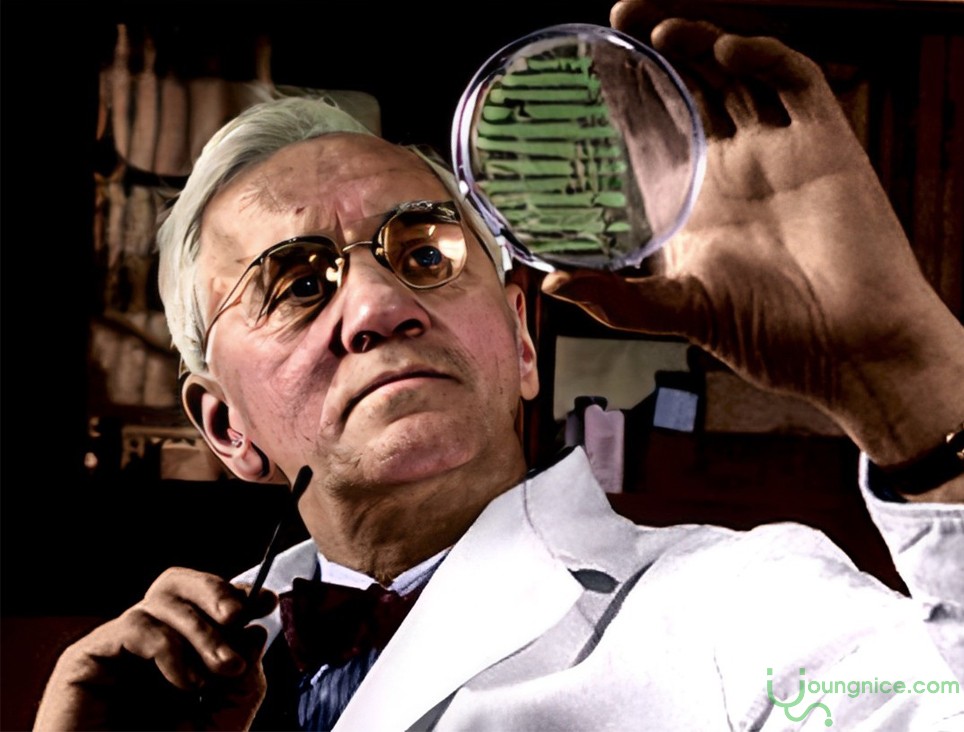Alexander Fleming was born on August 6, 1881, on a farm near the town of Darvel, England. His father passed away when he was just 7 years old, and his older half-brother from another marriage took care of him and ensured Fleming received an education. At the age of 13, Alexander was brought to London by another brother, Dr. Tom, to attend the Royal Polytechnic School, and he remained closely tied to the city for life.
By the age of 16, Alexander had passed all his exams and began working for the American Line shipping company. His duties included clerical work, copying documents by hand, maintaining accounting ledgers, and managing cargo and passenger records. In 1901, a sudden opportunity arose when an uncle passed away, leaving an inheritance to all the Fleming siblings. Dr. Tom Fleming used his share to establish a medical practice, which became quite successful. He encouraged Alexander to use his inheritance to pursue a medical education, which Alexander eagerly embraced to escape the monotony of his shipping job. However, entering medical school was challenging as Alexander was 20 years old, older than most first-year students, and had left regular schooling at the age of 13. He found a tutor for evening classes and in July 1901, passed all 16 subjects required for medical school admission. In October of that year, he was accepted into St Mary's Hospital Medical School. Initially motivated by a desire to change from his mundane clerical job, Alexander quickly developed a passion for medicine upon beginning his studies. He excelled academically and became renowned among his peers for winning awards.
In July 1904, he passed his first medical examination and pursued specialization in surgery. During his studies, Fleming witnessed many patients succumb to infections that no doctor could effectively combat. Fortunately, he had the opportunity to study under Professor Almroth Wright, a pioneer in researching ways to combat disease-causing bacteria.
Bacteria had been observed and documented since the 17th century. In 1870, French biologist Louis Pasteur proposed injecting a vaccine that weakened bacteria, thereby stimulating the body's natural defense mechanisms against diseases. Almroth Wright fervently supported this theory, and his persuasive lectures convinced Alexander Fleming to pursue a career in bacteriology.
In 1906, Fleming graduated from medical school and became a research assistant in Wright's department. He and his colleagues were drawn into researching the effects of vaccines on the body's immune system and the mechanisms behind their effectiveness. They conducted numerous experiments and achieved some success. In 1908, Alexander excelled in his next examination, earning a distinction and a gold medal. By June 1909, he passed his surgical specialty examination. Although he could have pursued a surgical career, he chose to remain in the bacteriology department, quickly establishing himself as a respected physician in the field.
In 1914, World War I broke out, and Fleming was deployed to a hospital in France to administer vaccines against trench fever to soldiers on the front lines. His research was temporarily halted during the war. After the war, he returned to St Mary's Hospital to continue his work in vaccine research.
In 1921, Fleming discovered a naturally occurring antiseptic substance. After numerous experiments and observations, he identified the body's first internal defense mechanism, capable of preventing common bacteria from causing harm if they breached this barrier. He named this substance Lysozyme. This discovery was crucial for his subsequent success.
Before preparing for a two-week summer break, Alexander Fleming forgot to tidy up his laboratory, a routine cleaning practice. Upon returning, on the morning of Friday, September 28, 1928, he noticed a Petri dish containing Staphylococcus bacteria cultures that had been left unattended for weeks. To his surprise, a mold growth (Penicillium) had developed near the edge of the dish. Remarkably, the area around the mold seemed to be clear of bacteria. Intrigued, Fleming conducted further experiments and found that the mold's secretion could prevent the growth of some dangerous bacteria. He named this newly discovered substance Penicillin.

At that time, however, Fleming and his colleagues were unable to extract and refine Penicillin for medical use. It wasn't until 11 years later that scientists Howard Florey and Ernst Chain of the University of Oxford successfully purified Penicillin and transformed it into a life-saving "miracle drug." In August 1942, at St Mary's Hospital, Alexander Fleming used Oxford's Penicillin to treat patient Harry Lambert, who was suffering from meningitis, a previously untreatable disease. Lambert recovered within a month, marking the beginning of Fleming's global fame and Penicillin's recognition as a groundbreaking medical advancement. Many consider Penicillin the greatest medical breakthrough of all time. Prior to the 1940s, hospitals were filled with patients suffering from infectious diseases, many of whom succumbed to them. Thanks to Penicillin, common bacterial infections were pushed back. Various forms of Penicillin are now produced, tailored for specific bacterial infections and available in oral and injectable forms. Penicillin truly revolutionized medicine.
In 1945, Alexander Fleming was awarded the Nobel Prize in Medicine alongside Ernst Boris Chain and Howard Walter Florey for their discovery and isolation of Penicillin—the first antibiotic used to treat infectious diseases.
Alexander Fleming passed away on March 11, 1955, leaving behind invaluable innovations that saved millions of lives. Today, while numerous antibiotics have been developed, Penicillin remains one of the most widely used antibiotics worldwide.